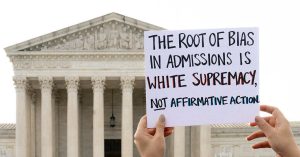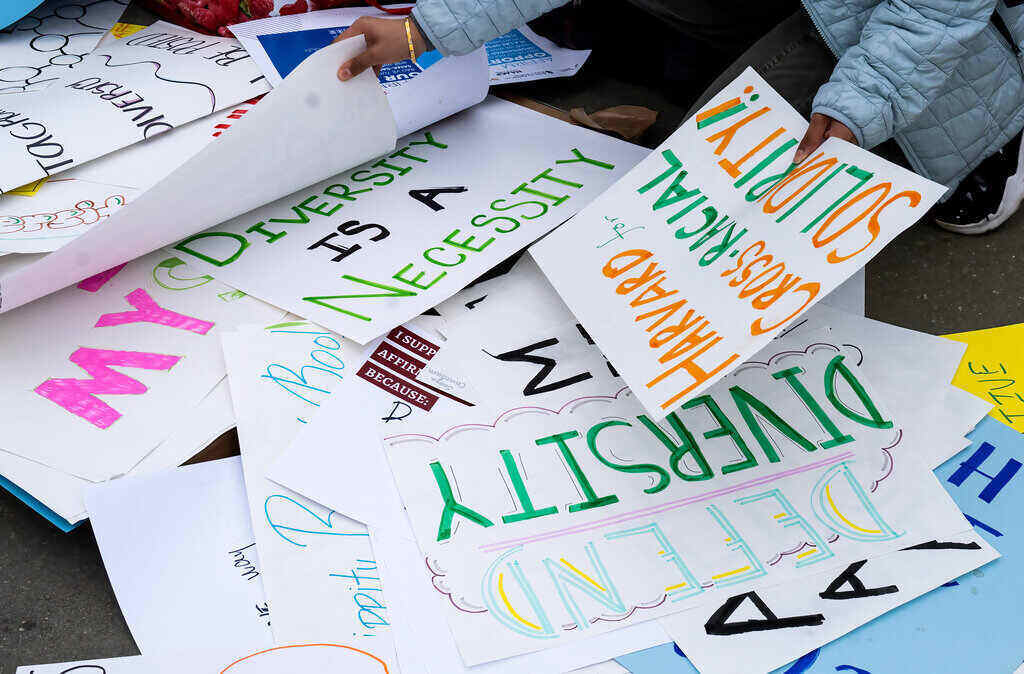|
Getting your Trinity Audio player ready...
|

The Supreme Court ruled against Affirmative Action in two separate 2022 University cases. Affirmative Action is the use of policies, legislation, and programs to improve educational and wage opportunities for minorities, as a means to combat long-standing discrimination.
Conflict of Affirmative Action
However, the policies have continued to be a derisive topic. In a 2019 Pew Research survey, 73% of Americans believed race and or ethnicity shouldn’t play a factor in college admissions.
Although public opinion has shifted in the last years. Pew released in 2023 another survey with 50% of Americans claiming race shouldn’t be a factor, roughly one-third being in favor, and 16% of Americans being unsure.
The NAACP President and Chief Executive Derrick Johnson spoke his distaste for the Supreme Court’s ruling. Stating the court “bowed to the personally held beliefs of an extremist minority.” Claiming this after the ruling against the equality programs in both the Harvard and University of North Carolina (UNC) cases.
Johnson had declared, “Race plays an undeniable role in shaping the identities of and quality of life for Black Americans,” He added. “In a society still scarred by the wounds of racial disparities, the Supreme Court has displayed a willful ignorance of our reality.”
Legal Opinion
The Supreme Justices also have varying opinions on the legitimacy and usefulness of Affirmative Action. With two long-standing defenders of Affirmative Action, Ruth Bader Ginsburg and Anthony Kennedy both gone, their conservative replacements are thought to believe the programs unconstitutional.
Samuel Alito, a 16-year serving Justice, declared, “What do you learn from the mere checking of the box?” Other Supreme Court Justices were more understanding about the case.
While fellow Conservative Justice Amy Coney Barrett considered “experiential statement” about a student’s race in favor of box-checking.

Justice John Roberts hypothesized if it can be “allowed to take into consideration what an applicant would say in an essay about having to confront discrimination growing up and how he or she did that?”
Justice Neil Gorsuch also claims the attempt to achieve diversity through legislation is akin to trying to meet racial quotas, which is federally prohibited. Ketanji Brown Jackson, another Justice, states that there is no clear evidence of race being the deciding factor for admission. That schools aren’t just looking at race “just because somebody checks a box.”
Edward Blum, the litigant who sued UNC and Harvard in 2022, also founded Students for Fair Admissions. A group accusing the use of Affirmative Action to be discriminatory against Asian and White applicants. Blum declared, “A university doesn’t have real diversity when it simply assembles students who look different but come from similar backgrounds…”
Other Options
Though there are cases against Affirmative Action, there are also those who believe it to be the solution to America’s racial inequality. For example, the UNC Affirmative Action Coalition works to keep the policies within their school.
In hopes of giving equal opportunity, members of the coalition hope for universities to find other options for fair opportunity. Such as ACT and SAT applications, ending preferences for children of alumni, and improving diversity and inclusion education.
However, those in support of Affirmative Action believe that ending it will lead to a decline in opportunity for Black and Brown individuals. Also, race-neutral policies aren’t stable enough to truly promote and maintain equality.
Policies enforcing race in professional areas are still ongoing.
Written By AriAnna Rathers
Sources:
NBC News: Key civil rights groups blast Supreme Court for curtailing affirmative action
CNBC: ‘Students will suffer’: Harvard and UNC students, alumni react to ‘disappointing’ Supreme Court ruling rejecting affirmative action in admissions
NBC News: Supreme Court leans towards ending affirmative action in college admissions
Pew Research: More Americans Disapprove Than Approve of Colleges Considering Race, Ethnicity in Admissions Decisions
NBC News: Supreme Court will consider challenge to affirmative action in college admissions
Featured Image Courtesy of Victoria Pickering’s Flickr Page – Creative Commons License
Inset Image Courtesy of Victoria Pickering’s Flickr Page – Creative Commons License



